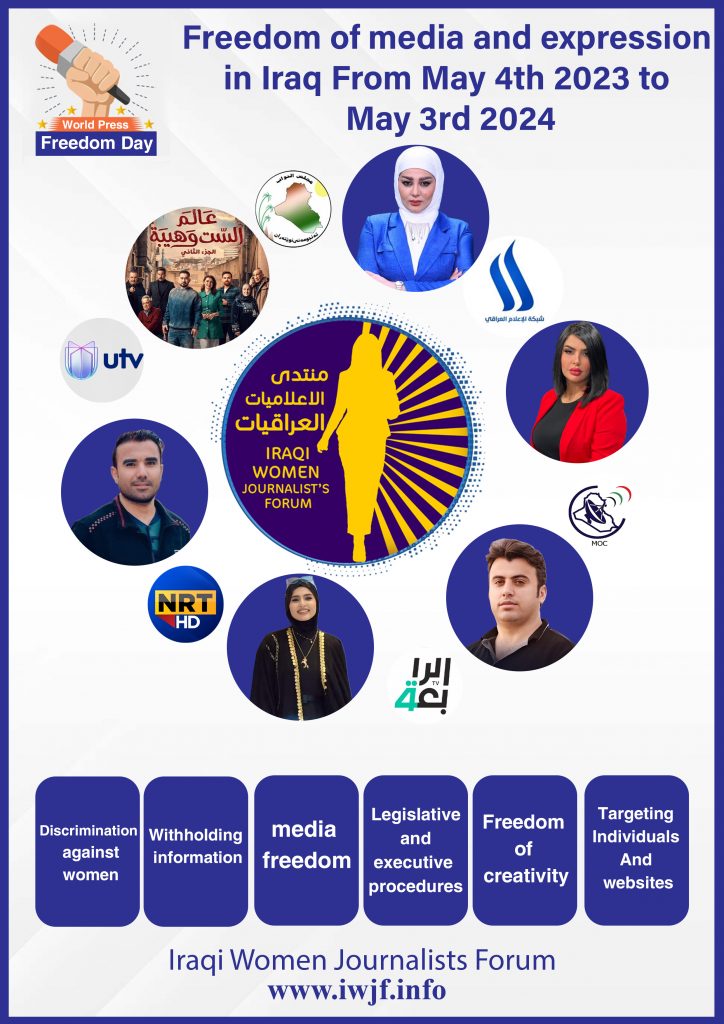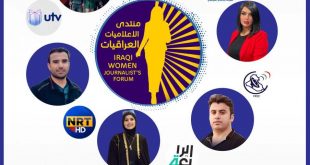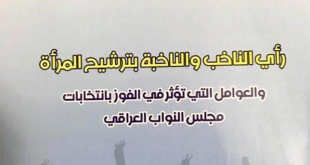Iraq witnessed 103 instances of violence and harassment against journalists, with 21 cases specifically
affecting women in media.
Prepared by the monitoring and documentation unit at the Iraqi women Journalists’ forum

Section I: Executive and legislative procedures.
- The legislative authority has yet to pass any significant legislation pertaining to the media, while also attempting to enact laws that would restrict the activities of civil society organizations.
- The Council of Commissioners of the Media and Communications Commission made decisions regarding the regulation of Iraqi drama scripts.
- Additionally, the Ministry of Communications implemented measures to block the Telegram application and called for the blocking of TikTok within the country.
Section 2: Freedom of the Press.
- Security and judicial authorities in central and Kurdistan region continue to restrict the work of journalists.
- Information censorship.
- Prohibition of covering demonstrations and protests.
Section 3: Digital Rights.
- Targeting individuals, websites, and social media influencers.
- Blocking access to a variety of websites.
Section 4: Creative Freedom.
- Suspension of the broadcast of the series “Alam Al-Sitt Waibba”.
Section 5: Discrimination and Abuse Against Women
Recommendations.
Introduction:
The security and judicial authorities in local governments and the Kurdistan Regional Government, as well as influential political factions and certain official media institutions, persisted in imposing repressive restrictions on freedom of expression in all its forms and manifestations. This targeting extended to both traditional outlets and new platforms such as social media, aimed at curbing the flow of information and limiting individuals’ ability to voice their opinions on government policies across all domains.
The report aimed to presenting and analyzing the public policies of security, judicial authorities, and institutions regarding press and media freedom, creative freedom, digital rights, the right to access information, the right to peaceful assembly and demonstration, and finally, the consideration of women’s rights in media coverage and achieving justice. These are the areas that the Iraqi Women Journalists’ Forum focused on monitoring and documenting, in addition to providing legal support to the victims of such violations through the legal clinic within the forum.
Additionally, the report is presenting and analyzing patterns and incidents of violations documented during the period from May 4th, 2023, to May 3rd, 2024, according to the monitoring and documentation methodology of the Iraqi Women Journalists’ Forum.
The report documented legislative and executive measures related to draft laws, governmental, and administrative procedures that threaten media freedom, expression, and the right to peaceful assembly as guaranteed by the Iraqi Constitution of 2005. Furthermore, it recorded over 103 cases of obstruction, arrest, detention, injury, raids, electronic breaches, suspension and closure orders, lawsuits, and media coverage bans of demonstrations, including 21 cases involving female journalists. The forms of violence varied from threats, physical violence, job-related harassment, electronic extortion, lawsuits, and detention.
The report is divided into five sections. Through these sections, we aim to shed light on the most prominent public policies and measures related to media freedom and expression, and to analyze the major patterns of violations observed during this report’s preparation.
First: Executive, Administrative, and Legislative Measures.
The parliament continued its delay in deliberating on media-related legislation and the enactment of a law limiting the activities of civil society organizations.
On July 27, 2024, Raed al-Maliki, a member of the legal committee, stated to local media that political disagreements persist regarding the Cybercrime Bill due to its clauses and penalties affecting freedom of expression. It was drafted for the first-time last year. Additionally, the parliament continued to refrain from legislating the Right to Information Law and the Law on Freedom of Peaceful Assembly and Demonstration due to political rivalries.
On April 27th, 2024, the parliament approved amendments to the Anti-Prostitution Law of 1988, which included ambiguous clauses. The amendments were concise in their definitions, lacking elaboration or clarification, which could open the door to discretion in enforcement and potentially be used to restrict freedom of opinion and expression. Moreover, it could lead to the suppression of activities of non-governmental organizations throughout Iraq.
The Council of Commissioners of the Media and Communications Commission issued a decision regarding Iraqi drama scripts.
On April 25th, 2024, the Council of Commissioners of the Media and Communications Commission issued several resolutions and recommendations, including the formation of a high-level committee to review scripts before their production. This measure was purportedly aimed at addressing recurring problems and offenses that periodically appear on screens. However, this decision contradicts previous resolutions and joint work protocols with the Artists Union concerning script examination. In these protocols, priority was given to specialists within the Artists Union for script review and assessment.
The Ministry of Communications issued a decision to block the Telegram application and called for the blocking of TikTok.
On August 6th, 2023, the Ministry of Communications announced the blocking of the instant messaging application “Telegram” in the country, based on directives from “higher authorities linked to national security and to safeguard citizens’ data.” The ministry stated in an official statement that the application violated data integrity laws. Media and cultural circles expressed their dismay and raised questions about the motives and reasons behind this ban, whether it is related to political events or other matters. The blocking of Telegram was considered a clear infringement and restriction of citizens’ rights to freedom of expression and communication.
On March 24th, 2024, the Iraqi Minister of Communications, Hayam Al-Yasiri, announced her request to the Cabinet to block the TikTok application. According to the Minister of Communications, the reasons behind this decision were that the application contributed to the fragmentation of Iraqi social fabric and lacked educational or scientific value, serving solely as an entertainment platform. The minister’s request sparked widespread reactions, including concerns that this could mark the beginning of a trend to block and censor other applications and websites, thus restricting citizens’ freedom of communication and expression.
Second: Freedom of the Press.
Local governmental and security institutions continue to restrict the work of journalists.
During the preparation period of the report, the Iraqi Women Journalists’ Forum observed a continued targeting of journalists by local governmental and security institutions in both central and regional areas. These actions ranged from physical assault, arrest, detention, equipment destruction, and raids.
The forum documented 10 cases of media coverage bans, over 11 journalists subjected to physical assault and equipment seizure, the arrest of 10 journalists, and the detention of 10 journalists from various cities in Iraq. Additionally, the health condition of journalist Kohdar Zibari deteriorated after the Kurdistan authorities refused to release him upon the expiration of his sentence.
On July 20th, a court in Erbil issued a new verdict sentencing journalist Shirwan Shirwani to 4 years in prison on fabricated charges. On December 1st, 2023, the Iraqi government blocked a news website for unknown reasons.
In an alarming precedent, the head of the Iraqi Media Network issued a decision to ban journalist Anne Salah, who works as a presenter on Al-Iraqiya channel, after she criticized the high cost of living on social media.
On February 23rd, 2024, the writer and journalist Fakhri Kareem survived an assassination attempt near the Presidential Square in Baghdad. This was followed by the abduction of a TV presenter and social media influencer by unknown armed groups on April 7th, 2024.
The table below illustrates some of the cases documented:
| Date | Case | |
| 1 | 7/5/2023 | The Asayish forces detained a correspondent from “NRT” channel to prevent him from covering the events in the Harir area in Erbil. |
| 2 | 11/5/2023 | The Federal Police in Kirkuk prevented the crew from “Zoomtv” channel from filming a mass grave and confiscated their equipment. |
| 3 | 12/5/2023 | The security forces in Nineveh Province prevented all media outlets from covering the visit of the Prime Minister. |
| 4 | 16/5/2023 | A news agency manager in Anbar faces a lawsuit over a fabricated charge. |
| 5 | 16/5/2023 | The Basra Investigation Court detains a television presenter due to a lawsuit filed against him by the governor, Asaad Al-Aidani. |
| 6 | 16/5/2023 | Staff from the channel ‘Al-Rashid’ were prevented from covering an event in Dijlah Village in Baghdad. |
| 7 | 24/5/2023 | The Sulaymaniyah Court Police prevented the ‘Ronmedia’ news team from coverage and confiscated their equipment. |
| 8 | 27/5/2023 | The security forces in Sulaymaniyah detained the crews of three satellite channels to prevent them from covering a protest demonstration. |
| 9 | 8/6/2023 | Raid on the home of a journalist correspondent in Sulaymaniyah and his detention for several hours due to a legal lawsuit against him. |
| 10 | 9/6/2023 | A security officer in Basra detains a journalist and assaults him. |
| 11 | 12/6/2023 | Dohuk police assault Nrt channel crew and smash their equipment during coverage of a demonstration in Dohuk. |
| 12 | 25/6/2023 | Journalistic teams were prohibited from covering the opening ceremony of the heritage houses in Old Basra. |
| 13 | 8/7/2023 | Dohuk police refused to return equipment seized from a media organization months ago. |
| 14 | 16/7/2023 | Security personnel from the Sunni Endowment Office confiscated the equipment of a journalist photographer after covering a speech by the head of the endowment. |
| 15 | 16/7/2023 | A security officer assaults a photographer from ‘Al-Rabea’ channel inside the City Sports Stadium in Basra. |
| 16 | 20/7/2023 | The security forces arrest three photographers and assault another during their coverage of the storming and burning of the Swedish embassy. |
| 17 | 20/7/2023 | The Erbil court issues a new verdict sentencing journalist Shirwan Shirwani to 4 years in prison on fabricated charges. |
| 18 | 7/8/2023 | The Antiquities Police in Kirkuk prevent journalistic crews from covering a demonstration in front of the Antiquities Department. |
| 19 | 14/8/2023 | Basra police detained three journalists to prevent them from covering a demonstration in front of the oil company’s gate. |
| 20 | 15/8/2023 | The Asayish seizes the equipment of journalistic crews documenting the Peshmerga conference in Erbil. |
| 21 | 19/8/2023 | The health condition of journalist Kohdar Zibari deteriorates after the authorities in Kurdistan refuse to release him following the expiration of his sentence. |
| 22 | 1/9/2023 | Security forces detained a photographer from ‘Al-Fallujah’ channel in Basra. |
| 23 | 16/9/2023 | A security personnel prevented the crew of ‘Al-Fallujah’ channel from performing their duties in Basra. |
| 24 | 13/10/2023 | The security in Anbar prohibited the ‘UTV’ crew from covering a solidarity rally with Gaza in the city of Fallujah. |
| 25 | 14/10/2023 | A security officer in Basra prevented the team from ‘Iraq 24’ channel from performing their duties. |
| 26 | 18/10/2023 | The riot police prevented a journalistic crew from covering a demonstration in Tahrir Square. |
| 27 | 29/10/2023 | Security in Kurdistan arrested a correspondent of ‘Roj News’ agency for unknown reasons. |
| 28 | 24/11/2023 | Security prevented the crew of ‘Al-Baghdadia’ channel from filming on Al-Mutanabbi Street. |
| 29 | 1/12/2023 | The Iraqi government blocked a news website for unknown reasons. |
| 30 | 22/1/2024 | The National Security arrested a journalist for publishing documents regarding a hospital fire in Diwaniyah. |
| 31 | 22/2/2024 | A security force raided the home of a journalist and arrests him for unknown reasons in Dohuk. |
| 32 | 23/2/2024 | The writer and journalist Fakhri Karim was subjected to an assassination attempt near the Presidential Square in Baghdad. |
| 33 | 25/3/2024 | Security forces in Sulaymaniyah arrested 4 journalists and prevent another journalistic team from covering the teachers’ protests. |
| 34 | 27/3/2024 | The Asayish prevented a journalistic crew from covering a demonstration of businessmen in Erbil. |
| 35 | 28/3/2024 | The head of the media network ordered the suspension of the TV host Anne Salah after she criticized the high cost of living on social media. |
| 36 | 7/4/2024 | The abduction of a TV presenter and a social media influencer by unknown armed groups. |
| 37 | 15/4/2024 | The journalist Fatimah Qaidar was subjected to a defamation and slander campaign on social media. |
| 38 | 21/4/2024 | A security force in Thi Qar raided the home of a journalist correspondent to arrest him. |
| 39 | 21/4/2024 | The local government prohibited several journalistic teams from covering the visit of the head of the Martyrs Foundation to Nineveh. |
| 40 | 25/4/2024 | An order for summons was issued by the Judicial Council against the journalist Amal Ali following a lawsuit filed against her by one of the MPs. |
Prohibition of covering protests and demonstrations:
In terms of the right to peaceful assembly and coverage by the media, the reporting period witnessed the targeting by security agencies of journalists and media institutions covering them. The following table documents these cases:
| 27/5/2023 | The security forces in Sulaymaniyah detained the crews of three satellite channels to prevent them from covering a protest demonstration. |
| 12/6/2023 | Dohuk police assaulted the crew of ‘NRT’ channel and smash their equipment during coverage of a demonstration in Dohuk. |
| 20/7/2023 | The security forces arrested 3 photographers and assault another by beating them during their coverage of the invasion and burning of the Swedish embassy. |
| 7/8/2023 | The antiquities police in Kirkuk prevented journalistic crews from covering a demonstration in front of the Antiquities Department. |
| 14/8/2023 | Basra police detained three journalists to prevent them from covering a demonstration in front of an oil company Gate. |
| 13/10/2023 | Security in Anbar prevented the staff of ” UTV” from covering a solidarity stand with Gaza in the city of Fallujah. |
| 18/10/2023 | Riot police prevented journalists from covering a demonstration in Tahrir Square. |
| 25/3/2024 | Security forces in Sulaymaniyah arrested 4 journalists and prevent another press team from covering teachers ‘ protests. |
| 27/3/2024 | Asayish prevented a press crew from covering a demonstration of businessmen in Erbil. |
Withholding information:
Despite the fact that a draft bill for the Right to Access Information has been in the Iraqi Parliament since 2012, numerous conferences, seminars, and workshops have been held to raise awareness about the importance of legislating the Right to Access Information law according to international standards. However, some political blocs have hindered the progress of legislation until now, fearing that it would expose cases of corruption in the country.
The delay in legislating the law contradicts with the international covenants and treaties ratified by Iraq, such as the International Covenant on Civil and Political Rights of 1966 (ICCPR). Article 19 of the ICCPR states in its second paragraph that “everyone has the right to freedom of expression,” including “the freedom to seek, receive, and impart information and ideas of all kinds without regard to borders, whether by word, writing, or printing, in artistic form or by any other means of their choice.” Journalists, activists, and experts have expressed their concern about the enactment of another law that contradicts the right to information, which falls under the umbrella of the Information Crimes Law.
Section three: digital rights
Targeting individuals and influencers through social media:
- The security apparatus in the Kurdistan Region continued a series of arrests and detentions to prevent some media outlets from reporting events to the public opinion.
- A group of female journalists, influencers, and content creators have been subjected to a systematic campaign of reputation defamation and fabrication of fake news, including (Fatima Qaidar, Ann Salah, Mona Sami, Sahar Abbas, Shahad Al-Shammari, and others). This campaign has resulted in one of the program presenters being abducted.
- On March 21, 2024, Iraqi authorities announced the uncovering of a network using social media platforms to blackmail security institutions, officers, and affiliates, and to extort them through the use of certain media personalities and influencers on social media. Despite the Ministry of Interior periodically announcing the arrest of individuals involved in electronic extortion, as well as the rescue of victims of extortion who have paid monetary sums.
- Social media accounts belonging to activists and journalists are subject to monitoring by both official and unofficial entities. This has resulted in some of them being threatened and harassed due to the posts they share on social media platforms, which restricts their freedom of expression and threatens their lives and futures.
Blocking of some social media platforms:
On August 6, 2023, the Ministry of Communications announced the blocking of the instant messaging application “Telegram” in the country based on directives from “high authorities linked to national security to preserve citizens’ data.” On March 24, 2024, the Iraqi Minister of Communications, Hayam Al-Yasiri, submitted a request to the Council of Ministers to block the TikTok application. According to the Minister of Communications, the reasons behind this decision were that the application had contributed to the disintegration of the Iraqi social fabric.
Section Four: freedom of creativity
The suspension of broadcasting the series “Aalam Set Wahiba.”
On March 18, 2024, the Iraqi judiciary decided to halt the airing of the series “Aalam Set Wahiba,” which had begun airing on the UTV channel during the month of Ramadan. Members of the parliament called for the suspension of the Iraqi series, citing what they perceived as insults to religious symbols in the characters of the series. However, the series had previously obtained approval from the Artists Union, and no violations were recorded by the union at the time of airing, it was broadcasted after obtaining all official approvals. The decision to suspend the series sparked widespread debate on social media, with comments ranging from mockery to anger at what activists deemed trivial reasons, such as the name of the protagonist of the series, “Mahdi,” who portrays a character involved in criminal activities. The decision to suspend the series prompted the Iraqi Artists Union to issue an official statement calling on the judiciary to reconsider the decision to suspend the airing of the Iraqi series “Aalam Set and Heba” Part Two, considering the decision “unfair to 400 actors and artists.”
Section Five: Discrimination and Abuse Against Women.
- Many complaints have been submitted to the legal clinic of the Iraqi Women Journalists’ Forum, presented by female journalists from various specialties, concerning discrimination and harassment in media institutions. A group of journalists have recounted instances of discrimination in participation (workshops, conferences, official interviews, and assignments), as well as in holding decision-making positions.
- Three female journalists were abruptly terminated from their positions without prior notice, citing the absence of official employment contracts being relied upon during their appointments in those institutions. This led to the loss of rights for these journalists and insufficient time to seek new job opportunities.
- Some media institutions have recorded a continuation of portraying women contrary to the stereotypical image through the programs and dramas they produce. They have not capitalized on the experiences of other countries, especially in the field of drama, to elevate the status of women, enhance their participation, and reduce violence against them, especially domestic violence and its consequences.
- The suspension of programs focusing on women in the Iraqi media network, such as “Nakhla Iraqiya” and “Nataqat Shahrazad,” despite the inclusion of the importance of state media (Iraqi Media Network) producing programs that address and educate on women’s issues and change prevailing stereotypical images in the Second National Action Plan for UN Security Council Resolution 1325, demonstrates a gap between policy objectives and implementation.
- The ongoing abuse of female journalists through social media platforms, as well as the derogation of their professional roles by associating them with influencers and bloggers to justify trespassing and humiliation, whether within institutions or in public life, is a concerning trend.
Recommendations:
- The Iraqi Women Journalists’ Forum calls on the parliament and the Iraqi government to legislate laws guaranteeing the right to access information and the freedom of peaceful assembly and protest.
- All security institutions are urged to respect freedom of expression, press, peaceful assembly, and protest, as guaranteed by the constitution, and to refrain from using violence against journalists and citizens, whether during media coverage or participation in protests.
- Security institutions should provide adequate protection for journalists, both male and female, from attempts of abduction, assassination, or blackmail.
- The Kurdistan Regional Government must release immediately those detained for expressing their opinions in all forms and cease targeting and excluding journalists for expressing their opinions.
- Cancellation of judicial rulings issued against users of social media applications on charges related to derogatory content, and the establishment of a process for handling harmful content through awareness, education, prior warning, and legal consequences awareness.
- The Ministry of Communications and the Media and Communications Commission are urged to respect freedom of creativity and not to repeat what happened regarding the dramas and programs that were banned, prohibited, and threatened during the past Ramadan. Instead, they should adopt administrative and technical formats after coordination with the Iraqi Artists Syndicate to preserve the freedom of creativity and television production.
- The Parliamentary Culture and Media Committee, as well as the Parliamentary Women’s Committee, are called upon to monitor and follow up on the rights of female journalists in both official and unofficial media institutions, licensed and authorized by the Media and Communications Commission. They should also monitor the fairness of appointments and employment regardless of gender, ensuring representation, participation, and their roles in management and decision-making, ensuring their presence and inclusion are guaranteed.
- Official and unofficial media institutions should organize training workshops for journalists to protect them from hacking, threats, and exposure to extortion and defamation on social media platforms.
- The Iraqi Media Network should provide ample space for programs that address women’s issues and ensure no discrimination based on gender in the preparation and presentation of programs.
 منتدى الإعلاميات العراقيات-iraqi women journalists form موقع منتدى الاعلاميات العراقيات- اول منظمة مجتمع مدني عراقية تعنى بالاعلام والمرأة
منتدى الإعلاميات العراقيات-iraqi women journalists form موقع منتدى الاعلاميات العراقيات- اول منظمة مجتمع مدني عراقية تعنى بالاعلام والمرأة


